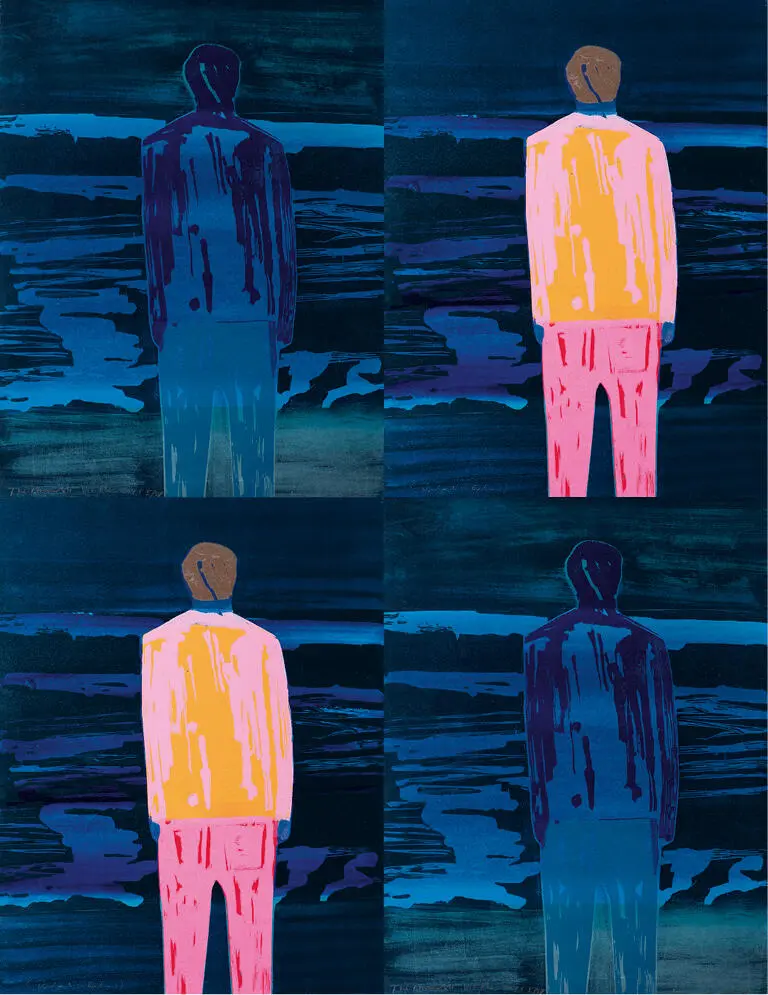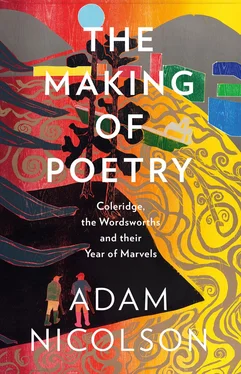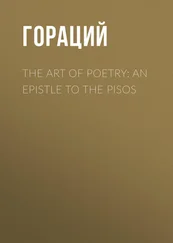Arabian fiction never fill’d the world
With half the wonders that were wrought for him.
Earth liv’d in one great presence of the spring …
all paradise
Could by the simple opening of a door
Let itself in upon him, pathways, walks
Swarm’d with enchantment, till his spirit sank
Beneath the burthen, overbless’d for life.
It may be that, at the height of the reign of Terror late in 1793, with Britain at war with France, Wordsworth quickly and secretly returned to see her – there are suggestions of that in The Prelude – but he was soon gone, and her piteous letters resumed:
Come, my friend, my husband, receive the tender kisses of your wife, of your daughter. She is so pretty, this poor little one, so pretty that the tenderness I feel for her would drive me mad if I didn’t always hold her in my arms. She looks like you more and more each day. I believe that I hold you in my arms. Her little heart beats against mine and I feel as if it is your heart beating against me. ‘Caroline, in a month, in a fortnight, in a week, you will see the most cherished of men, the tenderest of men’ … Always love your little daughter and your Annette, who kisses you a thousand times on the mouth, on the eyes … I will write to you on Sunday. Goodbye, I love you for life. Speak to me of the war, what you think of it, because it worries me so much.
Wordsworth never received that particular letter, as it was impounded by the Committee of Surveillance, and was only discovered in the 1920s, with one other, hidden in the files of a sub-police station in the Loire valley. But others of the same kind, all now destroyed, crossed the Channel, filled with appeals to a desperate conscience.
On his return to London, Wordsworth sank into the deepest depression of his life, besieged by guilt and ‘dead to deeper hope’, his soul dropping to its ‘last and lowest ebb’. He had lost all faith in human endeavour. His abandonment of Annette and Caroline was fused in his mind with the fate of the Revolution in France and the turn to repression in England, with his own lack of any future and the absence of much hope for the ideals Beaupuy had embraced and the happiness Annette may have represented.
Wordsworth wandered lost through these years. After 1793 France was at war with England, and Wordsworth, in love with liberty and in love with his own country, found himself torn in two. He moved from place to place – Wales, Yorkshire, the Isle of Wight, Salisbury Plain, London, Westmorland, Cambridge – without employment, without prospects, without money, without love, almost without friends, living sometimes in London, mixing in the circles around the rationalist republican William Godwin, involved with radical politics, writing at least one long attack on the Church and the establishment, sometimes in the north of England, occasionally reunited with his adoring sister Dorothy, just as often apart from her.
His depression was accompanied by radical, republican rage. Compassion, he wrote, was to be done away with. Liberty was to ‘borrow the very arms of despotism’, and ‘in order to reign in peace must establish herself by violence’. The contempt with which the Wordsworth family had been treated by the Earl of Lonsdale fuelled his hatred:
We are taught from infancy that we were born in a state of inferiority to our oppressors, that they were sent into the world to scourge and we to be scourged.
The British government was bent on suppressing the French contagion. In May 1794 Habeas Corpus was suspended and dozens of radicals were arrested. The following year seditious gatherings and pamphlets were banned. Free speech was gagged. Many writers, printers, publishers, booksellers and lecturers who had embraced the radical ideas of their generation were placed in the pillory, imprisoned for six months or more, harassed, interrogated, ruined or transported to Australia, from where few would ever return. Others were tried for treason or condemned to death in their absence. In these conditions, Wordsworth’s tirades were too extreme for any printer to risk their publication, and he remained almost unknown.

Wordsworth in Darkness
Through connections of the Godwin circle he met the Pinneys, whose house at Racedown was offered to Wordsworth brother and sister as a place of refuge away from the stress and strain of the city, from the stress and strain of his own mind.
In September 1795, Dorothy and William retreated to Dorset, taking with them little Basil Montagu, the son of a young lawyer also called Basil Montagu, whose wife had died in childbirth and who was struggling to bring up his son in his chambers in Lincoln’s Inn. The Wordsworths had the hope that other children might join them to make a little school at Racedown, whose fees they could add to the income from the investment of the legacy.
Darkness gathered around Wordsworth, although neither he nor his sister could admit as much in their letters. A disenchantment with political radicalism and its rationalist revolution had left him with a sense of having nowhere to go. He was afflicted with debilitating headaches. His nightmares of the Terror, as he would later tell Coleridge in The Prelude , had come with him:
I scarcely had one night of quiet sleep,
Such ghastly visions had I of despair
And tyranny, and implements of death,
And long orations which in dreams I pleaded
Before unjust Tribunals, with a voice
Labouring, a brain confounded, and a sense
Of treachery and desertion in the place
The holiest that I knew of, my own soul.
The sense of treachery and desertion was all-colonising: a betrayal of his own ideals, of the hope that had once glowed in France, of his youth, of his child, of her mother, of himself. It was an amalgam of fear and guilt. Wordsworth felt disconnected from the goings on of life and the world. He asked for newspapers to be sent to him, no matter if they were five days old by the time they arrived. He thought of himself as ‘a man in the moon’ who had no inkling of what was happening on earth. Coleridge would later describe Wordsworth’s ‘ unseeking manners’, that drift towards isolation, the refusal to engage with anyone or anything beyond himself. A kind of sardonic humour seeped out of him. ‘Our present life is utterly barren of such events as merit even the short-lived chronicle of an accidental letter,’ Wordsworth wrote to his Cambridge friend William Mathews, now a bookseller in London.
We plant cabbages, and if retirement, in its full perfection, be as powerful in working transformation on one of Ovid’s Gods, you may perhaps suspect that into cabbages we shall be transformed.
He had heard that remarks of that sort were circulating in London. ‘As to writing, it is out of the question.’
Cynicism and bitterness, a dark estimation of himself and others: these were the outlines of a Wordsworth lost. ‘We are now at Racedown and both as happy as people can be who live in perfect solitude,’ he wrote to Mathews.
We do not see a soul. Now and then we meet a miserable peasant in the road or an accidental traveller. The country people here are wretchedly poor; ignorant and overwhelmed with every vice that usually attends ignorance in that class, viz – lying and picking and stealing &c &c
He had sunk inward, in a kind of paralysis, held in uncertainty and perplexity, not bounding down the flank of a wheatfield but stalled at the gate, balked and blocked. It was, he later wrote, ‘a weary labyrinth’. He turned to bitter satire, imitating Juvenal, in which with ‘knife in hand’ his aim was to ‘probe/The living body of society/Even to the heart’.
Читать дальше













